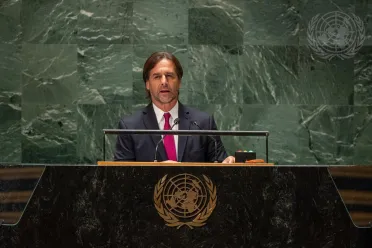Statement
Statement summary
LUIS LACALLE POU, President of Uruguay, said more than 190 representatives from countries around the world — with different economic, social, climatic and other situations — have gathered here and agreed to work together to achieve the same rights and principles. Yet he noted that regarding international law, the same bar is not always applied to larger countries as to smaller ones. The Assembly has gathered with an optimistic vision of humanity. Developments such as globalization, artificial intelligence and real-time communications can help the development of countries and people if they are used well. “We are living in a world with a lot of words without actions,” he said.
Uruguay comes to the Assembly as a stable democracy with full, stable institutions and respect for international law, he said. Its economy has recovered to where it was before the pandemic with strong employment, historic levels of public investment in infrastructure, foreign investment and financial stability. Public finances are in good order with inflation, for example, at an historic 18-year low. The Uruguayan people have a sense of responsible freedom. He noted that at the end of his Assembly speech delivered in September 2021, he had said the pandemic had reminded everyone that all were one. International responsible freedom, or liberty, and the well-being of independent countries are intrinsically linked to the common good. “We need to be aware of this, accept it and act as a result,” he said.
Noting the many references to the environment during today’s debate, he said Uruguay has been given the name “Natural Uruguay” because of its commitment to the environment. He noted that renewable energy levels are at 90 per cent and the country has significant reforestation activities and sustainable production processes. The economy and the environment are intrinsically linked. Several months ago, Uruguay issued a sustainable bond that is linked to compliance with the Paris Agreement. A system of benefits and penalties, linked to compliance with the Paris Agreement, should be applied to international loans, market access and tariffs in order to reward those engaged in environmentally friendly and sustainable practices.
Referring to the “sin of doing things well”, he said Uruguay’s improvements and increased standards means it no longer benefits from some international financial mechanisms, such as international trade support. A fresh look should be taken at some of these conditions. Finally, he firmly condemned the Russian Federation’s invasion of Ukraine and expressed solidarity with Ukraine. He agreed with the United Nations Secretary-General that voices should be raised against all authoritarian populism that violates human rights and hurts current and future generations, calling for a robust response from the international community.
Full statement
Read the full statement, in PDF format.
Photo

Previous sessions
Access the statements from previous sessions.
